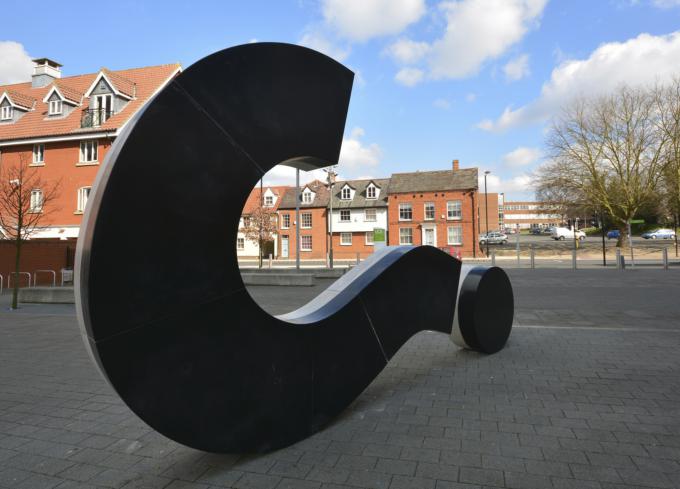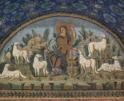
Faith
What cultural messages we take in with our eyes and ears informs how we look at our own lives. But today the culture has been converted from a quieter culture of reflection to a noisy culture of entertainment.

Ryan
There is a lame joke about the man who was seeking an answer to that somewhat out-of-fashion question, "What is the meaning of life?" He asked his friends, his old teachers, and people he considered wise. He scoured libraries. Finally someone told him about a Buddhist monk living high in the Tibetan mountains. Obsessed by the question, he traveled and traveled, climbed and climbed and finally he reached the old monk, sitting quietly in contemplation. "Oh, wise one, I have traveled thousands of miles seeking the answer to one question, 'What is the meaning of life?'"
The old monk thought and finally looked him in the eyes and said, "Try Google."
We were reminded of this story a few weeks ago when the country was in the grip of the murders in the historic Charleston church. One of the many commentators groping for an explanation for this heinous crime offered that Dylann Roof was probably searching for a meaning to his life and seized on white supremacy. Whether that is true or not, it would appear his nine Bible studying victims had found a meaning to their lives and were at that church deepening their understanding of that meaning.
The increasingly frequent reports of young Muslim youth becoming radicalized and setting out on jihad both here and abroad is also attributed to their search for meaning and finding meaning in bloody acts of terror. But why? Their quest is still mysterious.
The question of what is the meaning to our lives is surely as old as humanity itself. Early man, having taken care of his basic needs for food, shelter and some degree of safety, must have sat back and looked into the fire and mused, "What's going on? What is this existence all about?"
Since then the great parade of the Earth's people have wrestled with and poked at these ultimate questions. Our understanding of the question has been enriched by a legion of philosophers, theologians, artists and thinkers of all stripes. The very purpose of education has been to engage each person in this quest and pass on the best thought about who we are and how we should live our lives.
Our government run educational system is doing everything it can, in some cases consciously and other cases unconsciously, to keep us from addressing these questions of life's meaning., asking such ultimate questions as, "What is the true purpose of your life?" and "How should you spent your life?" In today's American public school classroom, teachers asking such questions and especially suggesting answers would have short careers.
Today getting an education is seen as the means to getting the tools to rise in the world's eyes. It is definitely not about gaining the Keys to the Kingdom.
What cultural messages we take in with our eyes and ears informs how we look at our own lives. But today the culture has been converted from a quieter culture of reflection to a noisy culture of entertainment.
The world of childhood, in particular, had more silence, as captured in Henry Wadsworth Longfellow's line, "A boy's will is the wind's will. And the thoughts of youth are long, long thoughts." Today the same boy's mind is force fed with Men in Black movies, hip-hop lyrics and porn.
We, adults, too, are victims of our increasingly intrusive culture, but the message to us from our popular culture is something on the order of "work hard so you can afford to retire early and veg-out." The culture works hard to keep our minds away from ultimate questions. Today's "cultural products" [i.e., films, music, books] are not intended to uplift our minds to consider first things, but to entertain us, to keep us from any serious exploration of who we are and where we're going.
Our Church, however, is very much in "the meaning of life" business. The purpose of weekly Mass is, first, to foster our intimate encounter with Christ in the Eucharist, and, second, as a faith community to hear Christ's words and a priest's sermon about the true meaning of our existence. In the Catholic life, there are many other opportunities to confront the meaning of our lives.
Progressive educators, in and out of our Church, lampoon memorization and, in particular, the Baltimore Catechism, as a means of conveying life's meaning. Perhaps, amid the ravages of today's intellectual and cultural hurricane, we should reconsider these resources we have cast aside.
We belong to a long running, campus book club that comes together several times a year to discuss classics, often books we had read in college. The group is relatively small, but quite ecumenical, composed of Christians and Jews, atheists and agnostics. Provoked by the books, the meaning of life is a perennial topic, hovering over our discussions.
Recently, the question was asked directly, and one of the group, a retired economist, who seems to have never forgotten a single thing, answered in a strong, staccato voice, "Man is a creature composed of body and soul, and made to the image and likeness of God. God made me to know Him, to love Him, and to serve Him in this world, and to be happy with Him for ever in heaven." It was straight from the Baltimore Catechism, which the Sisters of Charity of Halifax taught him and had him memorize during the first eight years of elementary school. Our friend learned the meaning of life young and has been mulling it over and deepening his understanding ever since.
KEVIN AND MARILYN RYAN, EDITORS OF "WHY I'M STILL A CATHOLIC," WORSHIP AT ST. LAWRENCE CHURCH IN BROOKLINE.
- Kevin and Marilyn Ryan, editors of "Why I'm Still a Catholic," worship at St. Lawrence Church in Brookline, Mass.
Recent articles in the Faith & Family section
-
Popular devotions and the liturgyFather Robert M. O’Grady
-
The Fight for Our FaithMaureen Crowley Heil
-
The shepherd's voiceScott Hahn
-
Scripture Reflection for April 21, 2024, Fourth Sunday of EasterJem Sullivan
-
The new Temple: How Easter changes religionDr. R. Jared Staudt


















